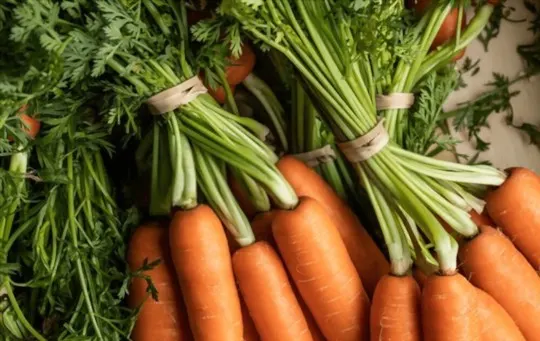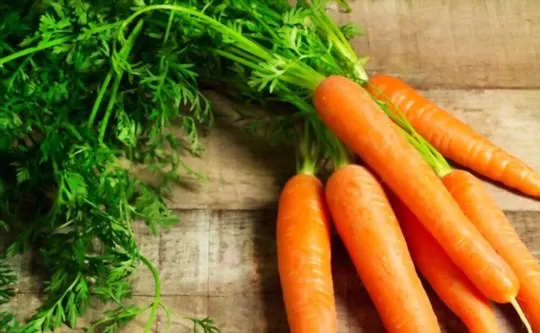Do you ever wonder what carrots taste like?
There seems to be a lot of confusion around this tasty vegetable, especially when comparing it to other vegetables in the root category.
While many folks might consider the flavor of carrots as sweet and tangy, that’s only scraping the surface.
In this comprehensive guide, we’ll explore all aspects of interpreting carrot flavors—from crunchy texture to earthy aroma—to give you an understanding of why they stand apart as one of the most popular veggies around!
What are Carrots?

Carrots are undoubtedly one of the most iconic and recognizable vegetables on the planet.
Known for their distinct orange color and sweet taste, these root vegetables are a popular ingredient in countless dishes.
However, there is much more to carrots than just their appearance and flavor.
In fact, these crunchy vegetables are packed full of essential vitamins and minerals, including vitamin A, potassium, and fiber.
Some studies even suggest that regular consumption of carrots may help to reduce the risk of certain diseases, such as heart disease and cancer.
Whether you eat them raw or cooked, carrots are a delicious and nutritious addition to any meal.
What Do Carrots Taste Like?

Carrots are a root vegetable, typically orange in color, with a crunchy texture and sweet, earthy flavor.
A combination of their natural sugars and a slight bitterness makes them a versatile ingredient in both sweet and savory dishes.
Their taste can vary depending on the variety and growing conditions, but in general, they have a slightly sweet, mildly earthy taste.
Carrots can also have a slightly bitter or peppery aftertaste.
In addition to their taste, carrots are packed with nutrients like beta carotene, vitamin K, and potassium, making them a healthy addition to any meal.
Pro tip: Try roasting carrots with honey and herbs for a sweet and savory side dish.
Factors that Affect the Taste of Carrots

Carrots are a root vegetable that grows underground and are commonly known for their sweet, crunchy taste.
However, the taste of carrots can vary depending on several factors.
Here are some factors that can affect the taste of carrots:
Soil Quality: The quality of soil in which the carrots are grown plays a significant role in their taste.
Soil that is rich in organic matter and nutrients can lead to sweeter carrots.
Climate: Carrots prefer cooler temperatures and mild climates, and therefore, the temperature and environment in which they are grown can impact their taste.
Days with cooler temperatures and nights with slightly warmer temperatures are ideal for carrot growth.
Carrot Variety: There are various carrot varieties, such as Nantes, Chantenay, and Danvers, each with their unique flavor profile, sweetness, and texture.
Carrot Age: The younger and fresher the carrot, the sweeter and more tender it is.
As carrots age, they become more bitter and woody in texture.
Taking these factors into consideration can help you choose the right carrot variety to grow and the best growing conditions to produce the sweetest and most flavorful carrots.
Culinary Uses of Carrots
Carrots are root vegetables, rich in beta carotene, vitamin A, and fiber.
They are crunchy, sweet, and have a slightly earthy taste with a mild, pleasant aroma.
Here are some of the popular culinary uses of carrots:
Raw: Carrots can be eaten raw, either as a standalone snack or as a crunchy addition to salads and coleslaw.
Cooked: Roasted carrots are a popular side dish, as are steamed and stir-fried carrots.
Baking: Carrots can be used in sweet baking, such as carrot cake and muffins, and added to savory dishes, such as stews and casseroles, for added sweetness and aroma.
Juices and Smoothies: Carrots can be juiced or blended with other fruits and vegetables to make healthy and refreshing beverages.
In summary, carrots are versatile and delicious root vegetables that can be enjoyed raw or cooked, and are a nutritious addition to any dish.
Nutritional Benefits of Carrots

Carrots are crunchy, flavorful root vegetables that have a slightly sweet taste and are packed with important nutrients for your body.
Here are some nutritional benefits of carrots:
Carrots are an excellent source of beta-carotene, a type of antioxidant that gets converted into vitamin A in the body.
This vitamin is essential for healthy eyesight and skin.
Carrots also contain fiber, potassium, and vitamin K, which helps with bone formation and blood clotting.
The high antioxidant content in carrots makes this root vegetable an excellent food for reducing oxidative stress and inflammation in the body, which can help prevent chronic diseases like heart disease and cancer.
Carrots have a slightly sweet taste with a crunchy texture that makes them versatile for both raw and cooked dishes.
Pro tip: To get the most nutritional benefits from carrots, try eating them raw or lightly steamed.
You can also use them in salads, soups, or as a healthy snack paired with hummus or guacamole.
Where to Buy Carrots and How to Store Them?

This heading seems to be a bit unclear or perhaps it contains two different topics.
To clarify, I’ll address both the possible topics mentioned in the heading:
Topic 1- Where to Buy Carrots and How to Store Them?
When buying carrots, make sure to choose ones that are firm, smooth, and brightly colored with fresh-looking green tops.
You can find fresh carrots at your local grocery store, farmer’s market, or even grow them yourself in your home garden.
To store carrots, first, remove the green tops and then wrap them in a damp paper towel before putting them in a plastic bag.
This will keep them fresh and hydrated for up to two weeks.
Topic 2- What are Carrots? What Do Carrots Taste Like?
Carrots are root vegetables that are usually orange but come in a variety of colors like purple, yellow, and red.
They are crunchy, sweet, and slightly earthy in taste.
The sweetness of the carrot increases as it cooks or roasts, giving it a deeper flavor.
With a low glycemic index, carrots are packed with vitamins and antioxidants, making them a nutritious addition to any meal.
Pro Tip: To add more flavor to your cooked carrots, try roasting them in the oven with a drizzle of olive oil and a sprinkle of herbs and spices.
Conclusion
In conclusion, carrots are versatile root vegetables that are delicious, nutritious, and easy to grow.
They have a sweet and slightly earthy taste, with a crisp texture that varies from crunchy to tender, depending on how they are cooked or consumed.
Raw carrots are ideal for snacking, salads, and dips, while cooked carrots can be boiled, steamed, roasted, and sautéed, and used in soups, stews, or side dishes.
Carrots are low in calories and high in fiber, vitamins, and antioxidants, making them an excellent choice for a healthy diet and a healthy lifestyle.
Whether you are a fan of traditional orange carrots or enjoy exploring heirloom and rainbow varieties, adding more carrots to your diet is a tasty and nutritious way to boost your well-being and creativity in the kitchen.

What Do Carrots Taste Like? A Comprehensive Guide
Ingredients
- Carrots
- Ingredients from your selected recipes
Instructions
- Select ingredients that work well together.
- Use a recipe or method that will enhance their natural taste.
- Taste and adjust the recipe as needed to achieve the desired flavor.

Carrie is a food writer and editor with more than 15 years of experience. She has worked for some of the biggest names in the food industry, including Bon Appétit, Food & Wine, and Martha Stewart Living.
As the Editor in Chief of IntroChicago.com, Carrie oversees all of the content on the site. She also manages the team of contributing writers and editors, who help to create delicious recipes, helpful tips, and informative articles that you’ll find on the site.
A native of the Chicago area, Carrie is passionate about all things food. She loves trying new restaurants and experimenting with new recipes in her kitchen. She’s also a graduate of the Culinary Institute of America, so she knows a thing or two about food!
